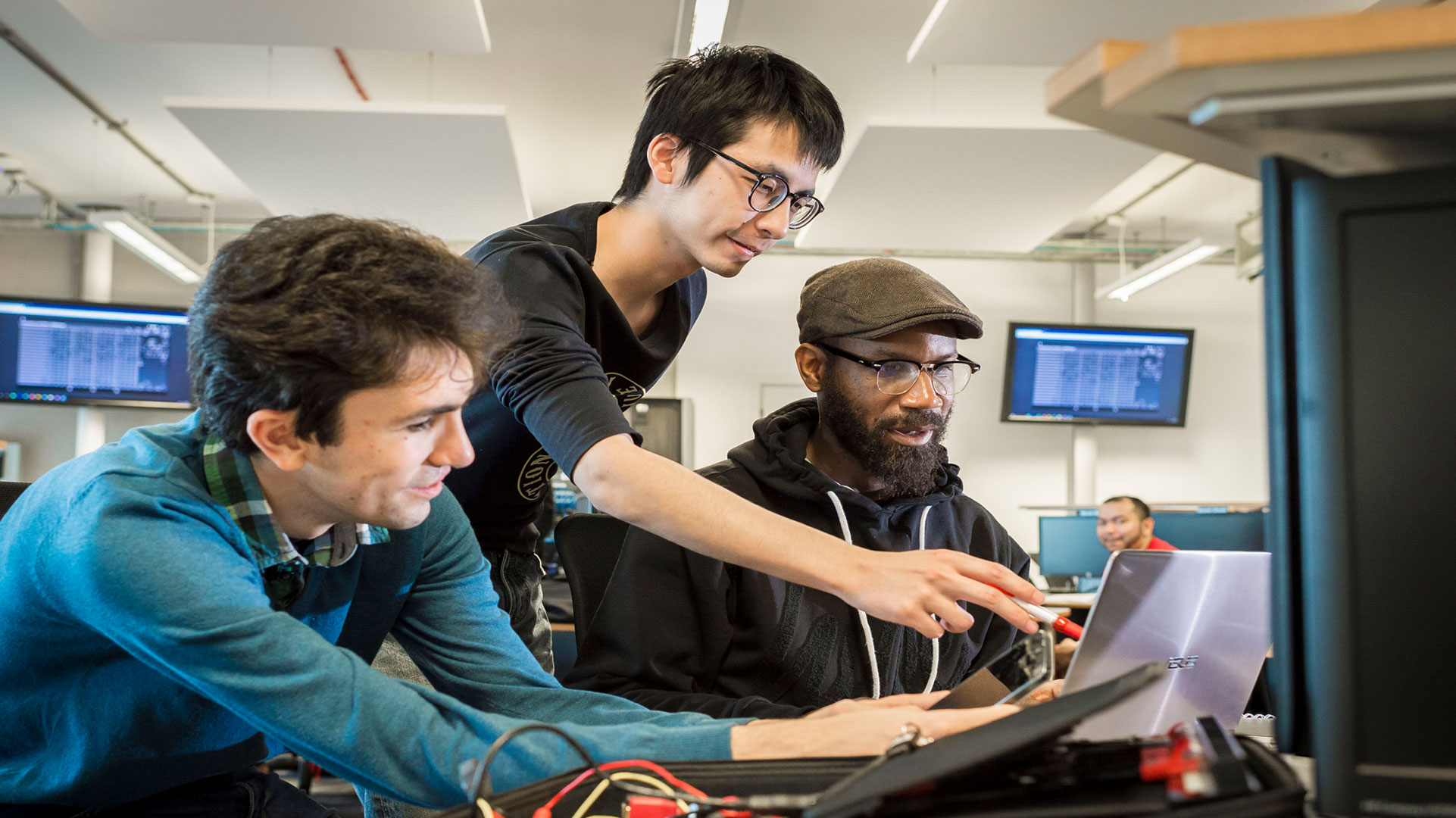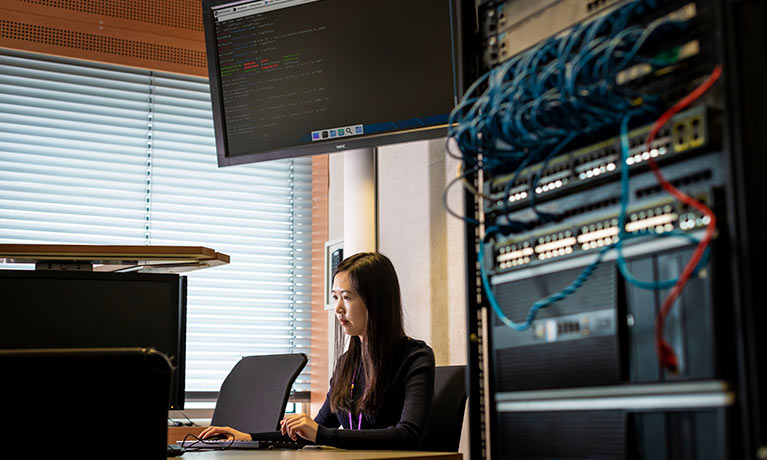Search
Informatics BSc (Hons) top-up
Study level: Top-up courses
Our Informatics BSc (Hons) course could broaden your technical IT skills and successful completion could potentially boost your career.
Course features
Year of entry
2026-27
Location
Coventry University (Coventry)
Study mode
Full-time
Duration
1 year full-time direct entry
Course code
G900
Start date
September 2026
January 2027
May 2027
The information on this page is for 2025-26 entry and should be used as guidance for 2026-27 entry. Please keep checking back on this course page to see our latest updates.
Course overview
The course enables you to 'top-up' your existing qualifications - a diploma, or equivalent certification, in computing or a related field - to the internationally recognised 'honours degree' classification.
- Study the most recent developments in today’s web-intensive environment, such as cloud computing, rapid application development and cyber security.
- Gain an understanding of the social, legal and ethical aspects of the modern computing environment.
Rated Gold Overall
Teaching Excellence Framework (TEF) 20235 QS Stars for Teaching and Facilities
QS Stars University RatingsTop 5 Student City in England (Coventry)
QS Best Student Cities Index 2026Why you should study this course
- Dedicated academic and technical support through the school's new Digital Literacy Centre (DLC).
- You will be provided with opportunities to become competent working in a multicultural environment with interdisciplinary teams.
- Optional modules allow you to specialise in areas such as cyber security, artificial intelligence (AI), open-source web development and software quality management.
- Access to industry-standard facilities in the Sir Frank Whittle and Beatrice Shilling buildings4.
What you'll study
The course consists of four compulsory modules and a further two optional modules.
We regularly review our course content, to make it relevant and current for the benefit of our students. For these reasons, course modules may be updated.
How you'll learn
Teaching contact hours
As a full-time undergraduate student, you will study modules totalling 120 credits each academic year. A typical 20 credit module requires a total of 200 hours study. This is made up of teaching contact hours, guided and independent study.
Teaching hours
Teaching hours vary each semester, year of study and due to module selection. During your first year you can expect 12-15 teaching hours each week. You will also have the option to attend optional sessions including time with a progress coach or to meet with staff for advice and feedback. As you progress through your studies, teaching hours may reduce.
Guided and independent study
Throughout your studies, you will be expected to spend time in guided and independent study to make up the required study hours per module. You'll be digging deeper into topics, review what you've learnt and complete assignments. This can be completed around your personal commitments. As you progress through your studies, you'll spend more time in independent study.
Online learning
As an innovative university, we use different teaching methods including online tools and emerging technologies. So, some of your teaching hours and assessments may be delivered online.
Assessment
This course will be assessed using a variety of methods which will vary depending upon the module.
Assessment methods may include:
- coursework
- exams
- group work
- projects
- individual assignments.
The Coventry University Group assessment strategy ensures that our courses are fairly assessed and allows us to monitor student progression towards achieving the intended learning outcomes.
Entry requirements
Typical entry requirements:
Fees and funding
| Student | Full-time | Part-time |
|---|---|---|
| UK, Ireland*, Channel Islands or Isle of Man | 2026/27 fees TBC 2025/26 fees: £9,535 per year |
Not available |
| EU | 2026/27 fees TBC 2025/26 fees: £9,535 per year with EU Support Bursary** 2026/27 fees TBC 2025/26 fees: £19,850 per year without EU Support Bursary** |
Not available |
| International | 2026/27 fees TBC 2025/26 fees: £19,850 per year |
Not available |
For advice and guidance on tuition fees and student loans visit our Undergraduate Finance page and see The University’s Tuition Fee and Refund Terms and Conditions.
The University will charge the tuition fees that are stated in the above table for the first Academic Year of study. The University will review tuition fees each year. For UK (home) students, if Parliament permits an increase in tuition fees, the university may increase fees for each subsequent year of study in line with any such changes. Note that any increase is expected to be in line with inflation.
For international students, we may increase fees each year, but such increases will be no more than 5% above inflation. If you defer your course start date or have to extend your studies beyond the normal duration of the course (e.g. to repeat a year or resit examinations) the University reserves the right to charge you fees at a higher rate and/or in accordance with any legislative changes during the additional period of study.
We offer a range of International scholarships to students all over the world. For more information, visit our International Scholarships page.
Tuition fees cover the cost of your teaching, assessments, facilities and support services. There may be additional costs not covered by this fee such as accommodation and living costs, recommended reading books, stationery, printing and re-assessments should you need them. Find out what's included in your tuition costs.
The following are additional costs not included in the tuition fees:
- Any optional overseas field trips or visits: £400+ per trip.
- Any costs associated with securing, attending or completing a placement (whether in the UK or abroad).
*Irish student fees
The rights of Irish residents to study in the UK are preserved under the Common Travel Area arrangement. If you are an Irish student and meet the residency criteria, you can study in England, pay the same level of tuition fees as English students and utilise the Tuition Fee Loan.
**EU Support Bursary
Following the UK's exit from the European Union, we are offering financial support to all eligible EU students who wish to study an undergraduate or a postgraduate degree with us full-time. This bursary will be used to offset the cost of your tuition fees to bring them in line with that of UK students. Students studying a degree with a foundation year with us are not eligible for the bursary.
Facilities
Your studies will be centred in high-specification learning environments that benefit from extensive social learning facilities, well-appointed laboratories, industry-standard equipment, lecturing facilities and classrooms, facilitating our innovative teaching methods across a diverse suite of courses.

Networking and Ethical Hacking and Cyber Security Laboratories
Contains 84 workstations, equipped with Cisco networking equipment and a range of open-source security suites, on a secured network that allows students to practice offensive and defensive security techniques.

Digital Literacy Centre
The DLC provides a range of help and support for digital, programming, and IT skills. From programming to email etiquette, from Word and Excel to enhancing your Google-Fu, the DLC provides a range of online and in-person help and support. Students can make use of drop-in sessions or book one-to-one appointments online and face-to-face.

sigma Centre
The sigma Centre provides a wide range of learning resources dedicated to mathematics and statistics. Students can make use of drop-in sessions or one-to-one appointments.
Facilities are subject to availability. Access to some facilities (including some teaching and learning spaces) may vary from those advertised and/or may have reduced availability or restrictions where the university is following public authority guidance, decisions or orders.
Careers and opportunities
Upon successful completion of this course, you should be able to:
- demonstrate a sound understanding of the main areas of the information technology curricula
- critically analyse and apply essential concepts, principles and practices of the subject in the context of loosely defined scenarios, showing effective judgement in the selection and use of related development tools and techniques
- produce work involving problem identification, the analysis, the design or the development of a system, with appropriate documentation
- demonstrate professional skills with an ability to show organised work both as an individual and as a team member, with minimum guidance
- be creative and innovative in your application of the principles covered in the curriculum
- apply appropriate practices within a professional, legal and ethical framework, and identify mechanisms for continuing professional development and lifelong learning
- contribute significantly to the analysis, design or the development of systems that are complex and secure, recognising the important relationships between these
- exercise critical evaluation and review of both your own work and the work of others.
Career destinations for successful graduates include cyber security, data science and mobile application development, or continued study at postgraduate level.
Further study
Alternatively, you may decide to pursue postgraduate study opportunities by studying courses such as Computer Science MSc, Cyber Security MSc or Data Science and Computational Intelligence MSc which could further enhance your employability.
How to apply
You may also like

Computer Science with Artificial Intelligence MSci/BSc (Hons)






